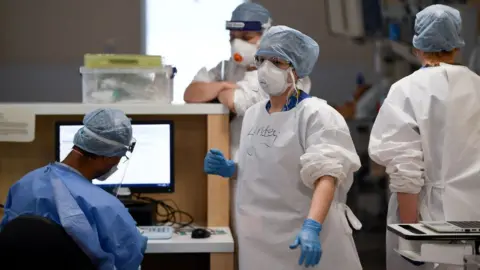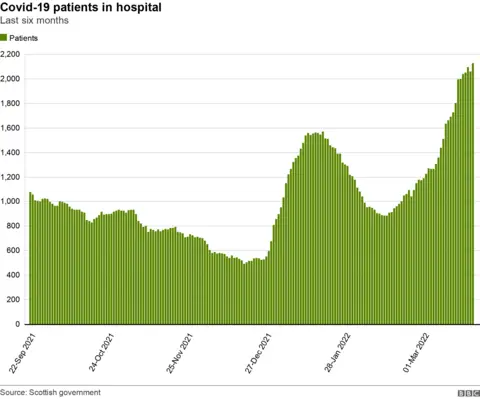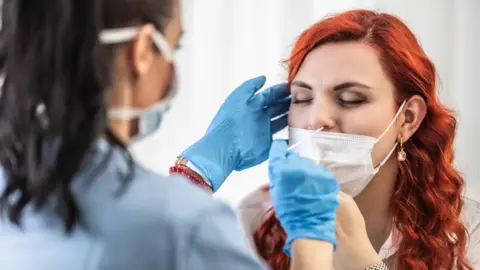Covid hospital numbers in Scotland reach new peak
 Getty Images
Getty ImagesThe number of patients in Scottish hospitals with Covid has reached the highest level seen during the pandemic.
Latest figures reveal 2,128 patients recently tested positive for the virus, higher than the previous peak in January 2021.
The number requiring ICU treatment, however, remains relatively low as fewer patients become seriously ill.
The latest Covid surge is thought to be driven by a more transmissible sub-variant of Omicron.
The latest daily figures revealed that a further 9,533 new cases were reported on Monday. No new deaths were reported but register offices are generally closed at weekends.
The number of people with Covid in hospital has risen by 78 since Friday but only 31 of the 2,128 Covid-positive patients were so ill that they required intensive care.

On Friday, data from the Office for National Statistics suggested that one in 14 Scots, a total of 376,300 people, had Covid in the week ending 12 March. Most cases are thought to involve the more transmissible BA.2 sub-variant of Omicron.
Omicron infections tend to be milder and with a large proportion of people vaccinated, the risks of becoming seriously unwell with this variant are relatively low.
Despite this, Prof Linda Bauld, an expert in public health at the University of Edinburgh who also advises the government, told BBC Radio Scotland's Good Morning Scotland programme the NHS was still under real pressure.
Prof Bauld said Covid-positive patients required more protocols which take more time, even if they were originally admitted to hospital for other ailments.
Waiting lists and staff absences have also been affected by outbreaks, she added.
She advised people should take up the offer of vaccines and expect future vaccines to protect against multiple variants.


Many health boards say they are seeing more Covid patients in hospital now than at any point in the pandemic.
Yet there is no clamour from medics and health officials for more restrictions - that's because Covid itself is less of a direct threat than it once was.
The vast majority of Covid patients do not need to be admitted to intensive care and are recovering more quickly. That's down to high vaccination rates and better treatments.
Instead Covid is causing a different sort of pressure on hospitals.
Patients need to be kept separate to limit infection spread, limiting bed capacity in some wards. You may need to pull nursing staff from places like outpatients or day surgery to cover gaps caused by staff absences. And shortages in social care mean it's harder to get people out of hospital.
It all leads to less capacity, people waiting too long in emergency departments and ever-growing waiting lists.
These are the sort of pressures that the NHS is going to have to deal with for a long time to come.

Most of the remaining legal Covid restrictions in Scotland have now officially come to an end.
Businesses are no longer required to retain customers' contact details - although the legal requirement to wear face coverings in shops, hospitality venues and public transport remains in place.
First Minister Nicola Sturgeon has said the rule will stay for "a further short period" because of the surge in cases.
The measure will be reviewed again before the Scottish Parliament's Easter recess on 2 April, and is expected to become guidance shortly afterwards.
Vaccine boosters have already been offered to the most vulnerable people and public health experts expect them to be rolled out to people in their 50s and 60s in the autumn.
'Ending testing is a mistake'
Asymptomatic people will still be advised to test regularly until 18 April - with tests free of charge - and people with symptoms should continue to get a PCR test until the end of that month.
However, the population-wide testing and contact tracing system will come to a close at the end of April - a move criticised by public health expert Prof Devi Sridhar.
She told BBC Scotland's The Nine: "We won't be able to pick up if there's a new variant spreading, if that's causing higher hospitalisation rates. People won't know if they're infectious to others.
"I think there's a real risk that we lose sight of this virus in surveillance so I think giving up testing is a huge mistake. Giving up testing will cost us not just in terms of the infection spreading but in the people it finds and kills."
 Getty Images
Getty ImagesSome public health experts have questioned whether face coverings will have any effect on the jump in case numbers.
Christine Tait-Burkard, from The Roslin Institute, has told BBC Scotland the impact that mask-wearing makes without many of the other restrictions in place "is small, or is smaller than it ever was before".
But she backed the extended retention of the legal requirement as "last reminder" of the need for caution.
'Be patient'
The first minister has said a sharp rise in infections was putting "significant pressure on hospital capacity", but that vaccines were still giving people good protection.
Ms Sturgeon, giving an update on the government's strategic framework for managing the virus last week, said she needed to "ask everyone to be patient for a little while longer on face coverings".
The Scottish Conservatives have described the retention of the mask rules as "a blow for households and businesses".
Scottish Labour's finance spokesman Daniel Johnson said the challenges facing Scotland's economy "didn't start with Covid and they won't end today".
He added: "Businesses across Scotland will breathe a sigh of relief as restrictions are lifted - but there is no room for complacency.
"The cost of living crisis will pile added pressure on to businesses, but the SNP and the Tory governments are failing to get to grips with the challenge."
A Scottish government spokesperson said its economic plan included "a ruthless focus on working with business and industry to deliver the changes we want to see".


